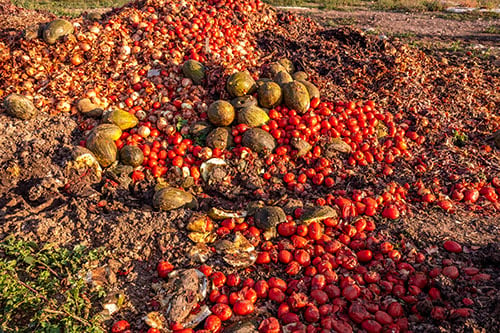US releases Draft National Food Waste Strategy at COP28

Closing out a year with increasing focus on the importance of food waste reduction, the U.S. released its Draft National Strategy for Reducing Food Loss and Waste and Recycling Organics in early December.
Release of the Draft National Strategy is significant, and in fact long overdue, as the U.S. committed to halving food loss and waste reduction in support of Target 12.3 of the Sustainable Development Goals (SDGs) back in 2015 – and a united, measurement-focused strategy is needed to get the U.S. on the proper pathway with urgency.
The Draft Strategy recognizes the importance of preventing the occurrence of food loss and waste, while also diverting all remaining excess food to its best possible use in seeking to build a more circular economy and address climate change through emissions reduction (citing EPA data reporting that 58% of landfill methane emissions released from the atmosphere stem from food waste).
It is anchored by four principal objectives, appropriately leading with prevention given that USEPA has estimated that up to 85% of the greenhouse gas emissions attributed to food waste occur prior to landfill (a theme that Leanpath also addressed earlier this year):
- Prevent food loss where possible
- Prevent food waste where possible
- Increase the recycling rate for all organic waste
- Support policies that incentivize and encourage food loss and waste prevention and organics recycling
In addition, the Draft Strategy includes several strategic actions for preventing the occurrence of food waste, including launch of a national consumer education and behavior change campaign, identifying and addressing the unique drivers of U.S. food wastage and incentives to reduce it, investing in behavioral science to change consumer behavior related to food waste, and testing new approaches to identify technology-based solutions to food waste along with the sharing of best practices, data and tools.
The Draft Strategy also notes that EPA and USDA will collaborate and work with external partners to improve measurement of food loss and waste to track progress toward the National Food Loss and Waste Reduction Goal and Target 12.3.
Notably, release of the Draft Strategy follows the October revision of EPA’s long-used Food Recovery Hierarchy, now the Wasted Food Scale, which more clearly illustrates that prevention
is the most preferred food waste reduction solution, followed by donation or upcycling. As we noted in November, the Wasted Food Scale draws on EPA research indicating that prevention, or source reduction, is “fundamentally distinct” from all other pathways for managing wasted food because it avoids all of the greenhouse gas emissions and resource consumption that would otherwise occur in the production, distribution, and eventual disposal of that food.
This fundamental distinction regarding the maximum benefit of prevention has been central to Leanpath’s focus for two decades. Last, and also significant, the Draft National Strategy was released at COP28, the annual conference which draws representatives from all nations of the world together to address the climate crisis.
Building on a solid footprint from last year at COP27, this year’s conference included significant focus on the connection between food systems (and specifically food waste) and climate change – given that the food system accounts for over a third of global emissions. Notably, the World Wildlife Fund (WWF) cited previous research in noting that “even if all non-food greenhouse gas (GHG) emissions were immediately stopped and were net zero from 2020 to 2100, emissions from food systems would still exceed the 1.5°C limit between 2051 and 2063.”
At Leanpath, we are pleased to see the continued increase in emphasis on food waste reduction as part of the global effort to address the critical (and related) challenges of climate change and food security, along with the continued evolution of focus on the maximum benefits of prevention.
We applaud the Biden-Harris administration’s release of the Draft National Strategy and the stream of research and reporting from U.S. agencies leading to it, and we remain committed to our mission of making food waste prevention everyday practice in the world’s kitchens.
